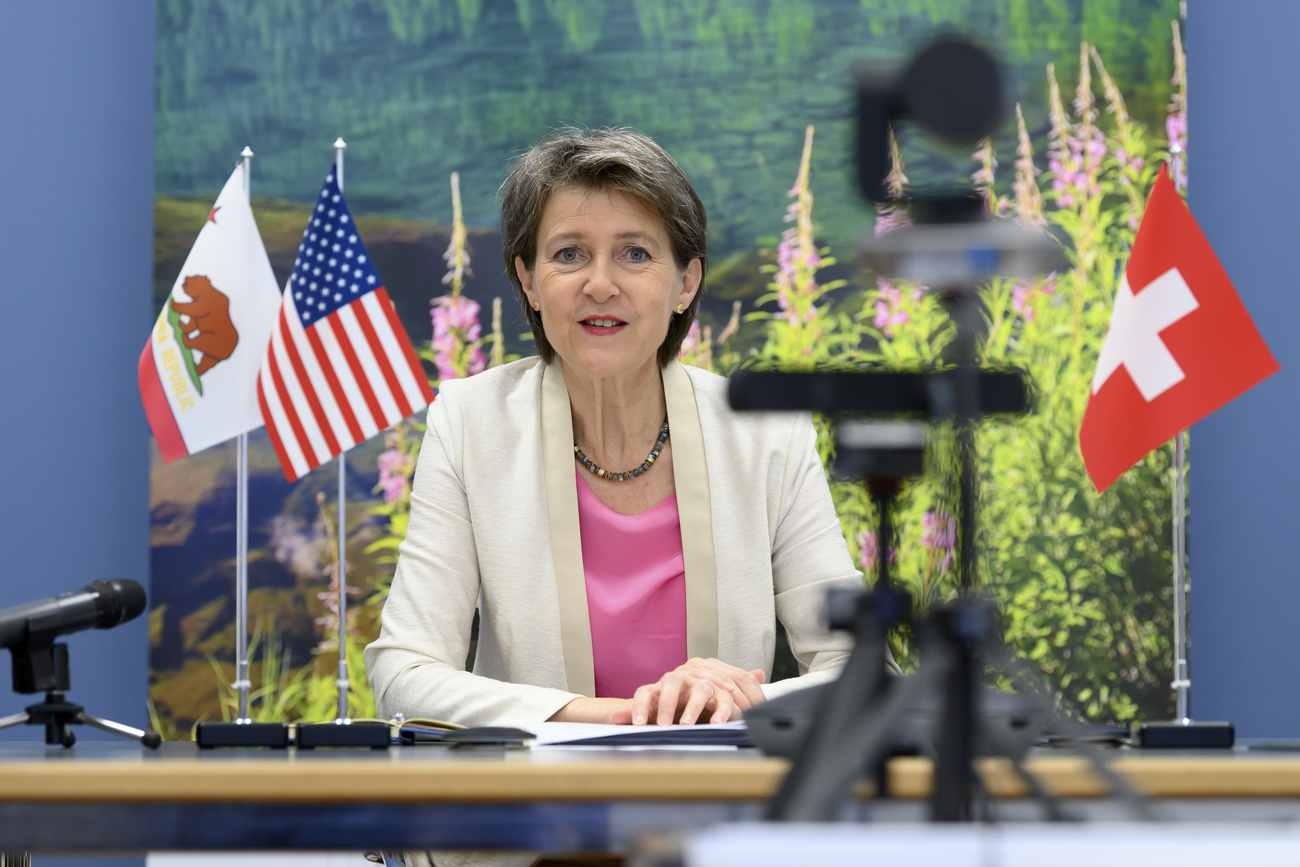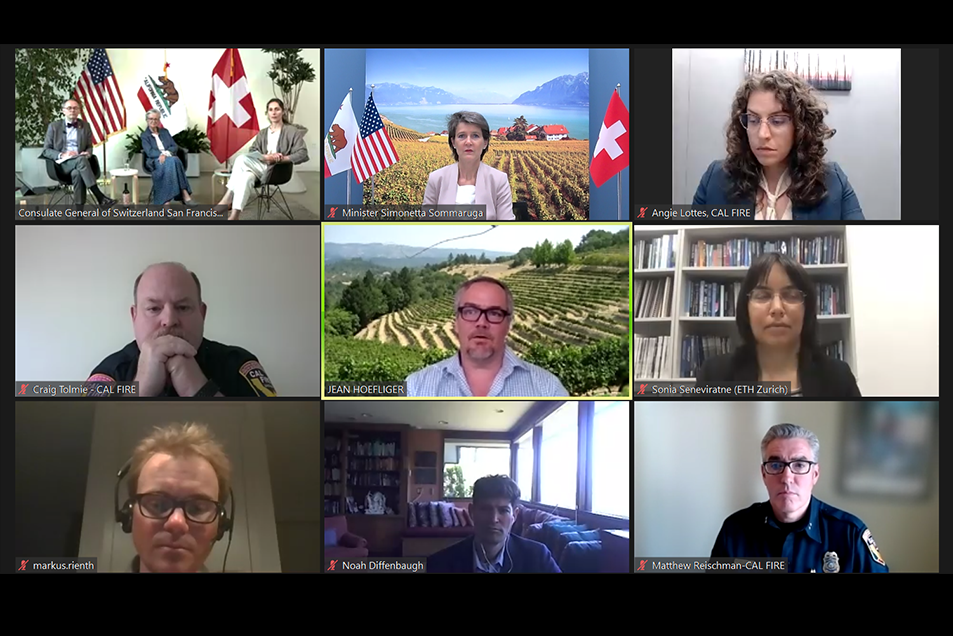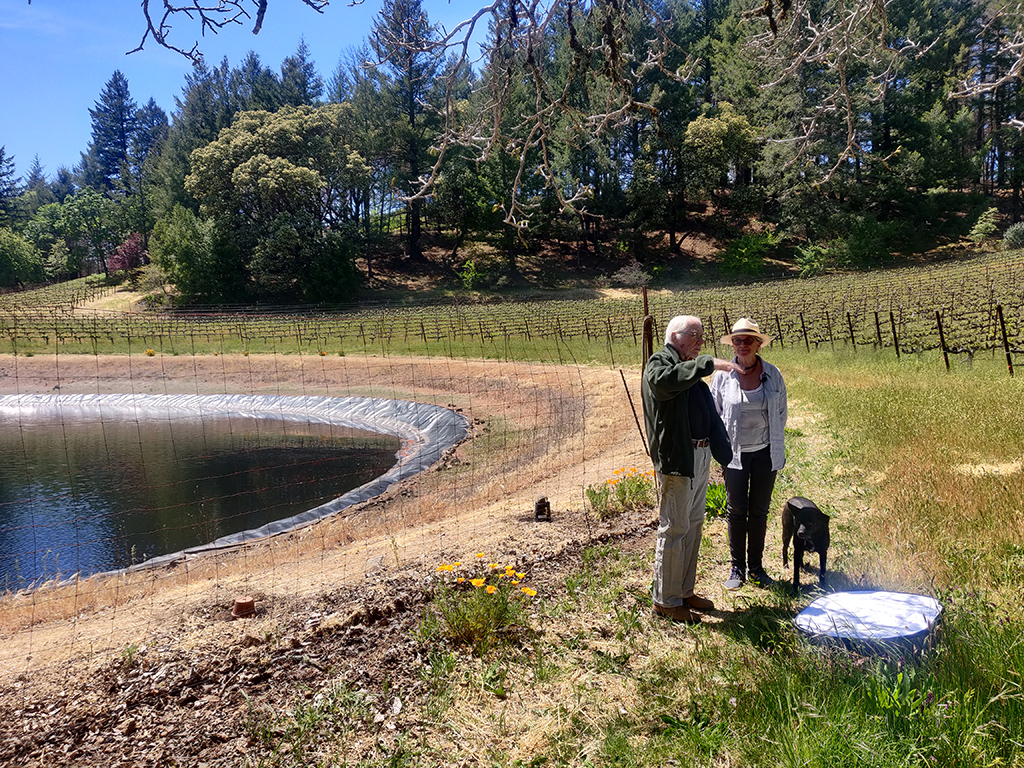
Switzerland looks to California to achieve climate goals

The Swiss environment minister has just completed her first virtual visit overseas. SWI swissinfo.ch sat down with Simonetta Sommaruga to ask her how digitalisation is changing diplomacy, and about the future of Swiss climate policy after voters rejected the revised law on CO2.
SWI swissinfo.ch: You have just completed your first digital working visit as a way to test out a more climate-friendly approach to trips abroad. What has the experience been like?
Simonetta Sommaruga: I’m thrilled! I was in a national park in California and had the feeling of really being there. You save a lot of time and CO2 emissions with a virtual trip. The potential is enormous.
SWI: Could you also conduct difficult negotiations this way in the future?
S.S: There are limits, of course. These virtual visits cannot replace face-to-face encounters. A confidential conversation behind closed doors wouldn’t be possible in this format. When there are conflicts involved, you want to be there without a screen separating you.

SWI: How will digitalisation change diplomacy?
S.S: Digital diplomacy can enable broader participation. I have had these discussions with several environment ministers and representatives at the United Nations during ongoing preparations for the next global climate conference. If the preparatory work prior to negotiations can take place digitally, then countries that would otherwise find it difficult to travel to the venue due to resource constraints can still participate. The UN has repeatedly offered support for the infrastructure needed for this.
SWI: Since the pandemic, some diplomats in Geneva are in favour of a hybrid approach – face-to-face and virtual – to international meetings, partly to increase participation. Would this approach be beneficial for International Geneva, and would the Swiss government support it?
S.S: It is indeed the government’s goal to position and strengthen International Geneva in digital diplomacy. These new possibilities should be tried out in Geneva – we have gathered a lot of expertise there.
It’s an advantage, but now we also have to put it into practice and build on it. This way, we can figure out what works and where it may be better to have face-to-face meetings or use hybrid options.

SWI: During your virtual visit, you talked with officials in California about climate protection. This came just after Swiss voters rejected the proposed law on CO2 [on June 13]. Did the Californians raise this issue?
S.S: I brought it up myself. Like us, California is familiar with direct democracy. When it comes to climate protection, we have to take the people along with us. If people feel that the measures are too burdensome or constraining, then we won’t win at the ballot box. My interlocutors in California believe that sometimes it takes several tries. We’ve also experienced this in Switzerland.
SWI: Have you heard reactions from other countries regarding the outcome of the vote? Are there concerns that Switzerland will not be able to achieve its climate goals?
S.S: I have received a few calls from energy and environment ministers in other countries. There is a lot of interest in this question: why did this law fail? According to our initial analysis, the law addressed different areas and so there was a broader scope for attacks against it. Now we have examined the result of the vote more closely, we can look for other paths, together with the business community and parliament.
SWI: The foreign affairs minister, Ignazio Cassis, has raised the possibility of Switzerland joining the European Green Deal. This was actually your idea.
S.S: [laughs] I actually raised this idea a year ago when I held the rotating presidency and had my first meeting with the president of the European Commission, Ursula von der Leyen. The idea wouldn’t be for Switzerland to contribute financially. The Green Deal is not primarily a financial project – rather it is intended to strengthen decarbonisation and climate protection in the EU. I think Switzerland should be in close contact with the EU on this subject, to see how we can learn from each other.
Switzerland shares many affinities with the golden state. “We chose California for the virtual trip because of its direct democracy, focus on innovation and many commonalities in the climate field,” Swiss Environment Minister Simonetta Sommaruga told SWI swissinfo.ch.
Relations with California are important for other reasons too. As Sommaruga pointed out, if California were a country, it would be the fifth-largest economy in the world. Its GDP surpasses $3 trillion (CHF2.7 trillion) and Swiss-owned businesses create more jobs there than in any other US state. They also pay the highest average salaries compared to affiliates from other countries that invest heavily in the state, according to the Swiss consulate in San Francisco. Last year 120 major Swiss firms, including Nestlé, ABB and Kuehne + Nagel, had subsidiaries in the state of 40 million people.
California is home to a large Swiss community, among them many successful figures ranging from venture capitalists, artists and executives to tech entrepreneurs.
The minister’s four-day virtual visit included bilateral meetings with state officials, tours of a redwood forest and a vineyard, visits to firms, and roundtable discussions with climate experts, local authorities and businesses.
To make the visit possible, organisers at the Swiss consulate and Swissnex, the Swiss innovation office in San Francisco, relied on videoconferencing platforms that have become seemingly commonplace since the pandemic – with the occasional technical hiccup involving fiddly mute buttons and frozen images of speakers. But there were also novelties, like the use of professional video cameras and lighting to “escape the usual perspective of a zoom meeting”, and gimbal cameras and drones to “capture the endangered paradise in Napa Valley”, a consulate official told SWI swissinfo.ch.
SWI: Back to your trip to California: Why California of all places?
S.S: Both California and Switzerland have a direct democracy system with referendums. This shapes a country – we are always making change together with the people. Sometimes there are setbacks, when voters choose not to accept something, and you have to find other solutions that they will support. That’s something that connects us.
My trip to California focused on climate protection. California too is greatly affected by global warming, with forest fires, bush fires and droughts. That is less so directly the case for us, but it’s something that is coming our way.

More
Newsletters
Some Swiss companies play an important role in California, such as in the electrification of railways. So, we are trailblazing. During the trip I visited a wine-growing region. The issue of climate change and viticulture affects both Switzerland and California, so we were able to exchange experiences on this.
SWI: Did you see any specific measures to combat climate change during your visit that you think could also work in Switzerland?
S.S: Yes. California is re-building its entire power system – from fossil fuels to renewable energies. Switzerland is doing the same. We both want to become climate neutral – Switzerland by 2050, California by 2045. When it comes to restructuring the power system and investing heavily in photovoltaics, we can learn from California. For example, how did the government gain voters’ support for this?
SWI: And what can California learn from Switzerland?
S.S: We have a lot to offer in the area of public transport. We have a companyExternal link that develops electric trucks. In California there is Tesla. So, we can learn from each other.
Simonetta Sommaruga trained as a pianist, gave concerts and taught piano for many years before becoming head of a consumer protection foundation. She first entered politics as a local councilor, then as a representative in the cantonal parliament in Bern. She was elected to the Federal Council, the Swiss executive body, in 2010. The 61-year-old served as minister of justice and police for several years before moving to the Federal Department of the Environment, Transport, Energy and Communication (DETEC) in 2019.
Source: DETEC

In compliance with the JTI standards
More: SWI swissinfo.ch certified by the Journalism Trust Initiative



























You can find an overview of ongoing debates with our journalists here . Please join us!
If you want to start a conversation about a topic raised in this article or want to report factual errors, email us at english@swissinfo.ch.